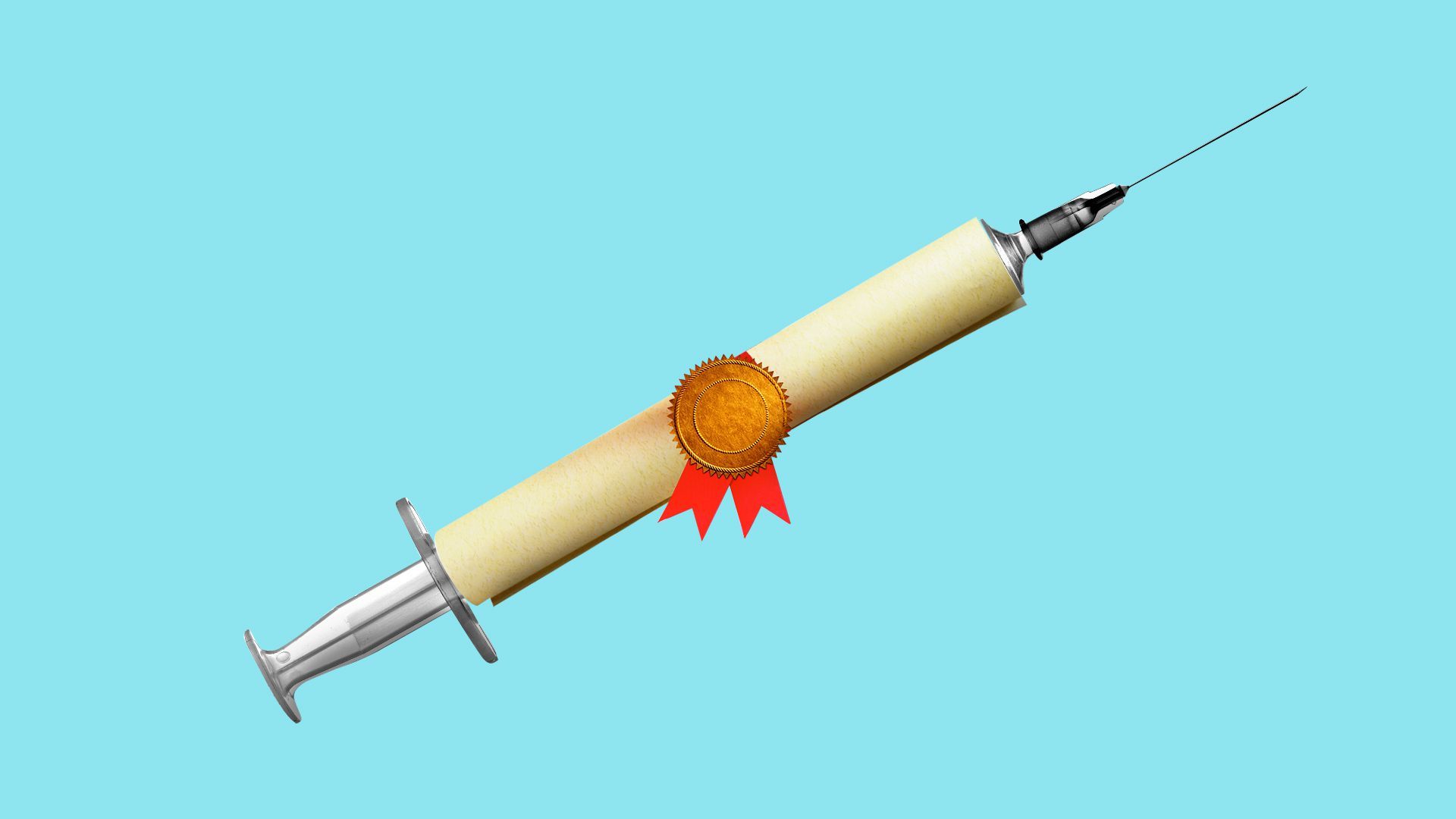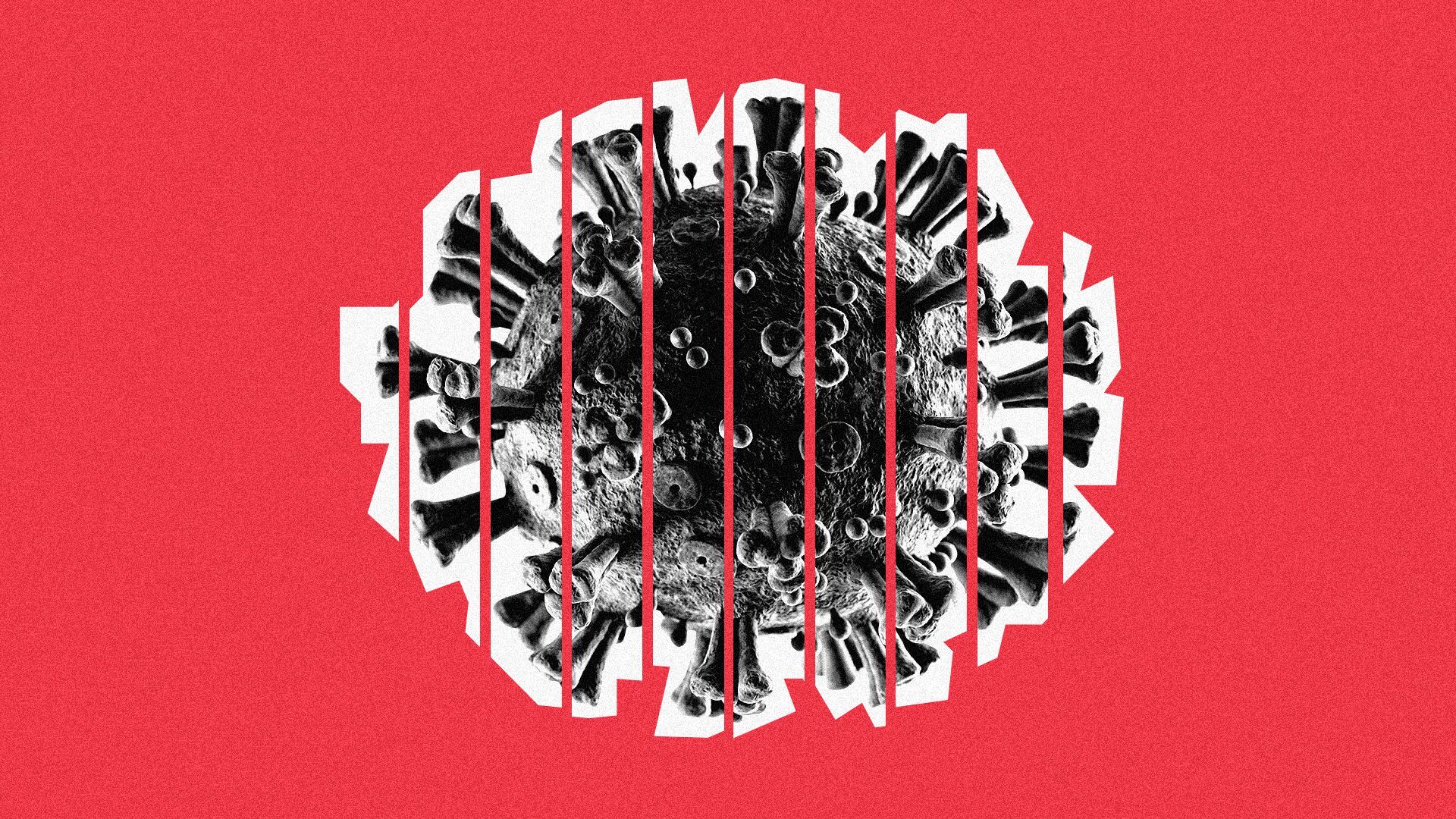| | | | | | | Presented By UnitedHealth Group | | | | Vitals | | By Caitlin Owens ·Mar 30, 2021 | | Good morning. Today's word count is 1,080, or a 4-minute read. | | | | | | 1 big thing: The growing fight over coronavirus vaccine patents |  | | | Illustration: Aïda Amer/Axios | | | | A growing chorus of advocates wants to weaken some of the intellectual property protections for coronavirus vaccines, which they say will quickly expand global supplies. But critics say the move wouldn't work, and would set a bad precedent. Where it stands: The Biden administration is evaluating the idea, including whether it would work as intended. The big picture: Rich countries, including the U.S., are well into their vaccination efforts, while many developing nations have yet to begin. - Around 100 countries, led by India and South Africa, want the World Trade Organization to temporarily suspend some intellectual property rights for coronavirus vaccines and treatments, Nature reports.
- "If a temporary waiver to patents cannot be issued now, during these unprecedented times, when will be the right time?" Tedros Adhanom Ghebreyesus, the director general of the World Health Organization, recently tweeted, the Washington Post reports.
The other side: The U.S., the EU, the U.K. and most major pharmaceutical companies have opposed the measure so far. - "COVID-19 vaccines are complex biologic products," 31 board members of PhRMA, the drug industry's leading trade group, wrote in a letter to Biden earlier this month. "Eliminating protections would not speed up production."
- "The thing about vaccines is that, unlike a drug, you can't just [follow instructions] and assume that you've got a vaccine. This is a complex biological process that has multiple quality-control steps," Jerome Kim, director-general of the International Vaccine Institute in Seoul, told Nature.
What we're watching: The Biden administration says it's looking into the idea. - "We ... are evaluating the efficacy of this specific proposal by its true potential to save lives," USTR spokesman Adam Hodge told CNBC.
- Pressure on the administration may be increasing. Some progressive lawmakers support the waivers, and House Speaker Nancy Pelosi recently sent a letter "urging the administration to study the issue," per CNBC.
Go deeper. |     | | | | | | 2. Good news on vaccine hesitancy |  Reproduced from Kaiser Family Foundation; Chart: Axios Visuals The number of Americans who have already been vaccinated or want to receive their shots as soon as possible continues to rise, although enthusiasm still varies significantly by demographic group, according to the latest KFF vaccine tracking poll. Between the lines: Republicans, white evangelical Christians and rural residents remain most likely to say that they won't get the vaccine, while older Americans, Democrats and college graduates are most enthusiastic. By the numbers: 61% of Americans have either been vaccinated or intend to be as soon as they can, KFF found. - Only 17% of Americans are still taking a "wait and see" approach to the vaccine, down from 39% in December. The share of Americans who say they definitely won't take the vaccine has remained about the same since December, and was at 13% this month.
- Black adults saw the largest increase in vaccine enthusiasm this month, with 55% now saying they've gotten the vaccine or will as soon as possible — a 14-percentage-point increase since February.
|     | | | | | | 3. The vaccines vs. variants race continues | | Good news: The Pfizer and Moderna vaccines are 90% effective in preventing COVID-19 infections, according to the first big study using real-world data collected after their clinical trials, Axios' Marisa Fernandez reports. - They were both 80% effective after one dose and 90% effective after two doses.
- Why it matters: This study involved vaccinated health care workers — people at a high risk of exposure to the virus — and the fact that the vaccines' efficacy still held up under those conditions is more evidence of just how well they work.
Yes, but: CDC director Rochelle Walensky issued an emotional plea yesterday for Americans to hold off on risky social interactions just a little while longer, saying she feels a sense of "impending doom" because variants and looser restrictions could send the U.S. into a fourth wave of rising infections. - President Biden on Monday asked governors, mayors and local leaders to maintain or reinstate mask mandates.
What's next: 90% of Americans will be eligible for a vaccine and will have a vaccination site within five miles of their homes by April 19, Biden said. - The administration is increasing the number of pharmacies in the federal vaccination program from 17,000 to nearly 40,000, and plans to set up a dozen more mass vaccination sites by that time.
|     | | | | | | A message from UnitedHealth Group | | UnitedHealth Group's ideas to lower drug costs | | |  | | | How to lower drug costs: - Capping drug exclusivity can save Medicare more than $20 billion.
- Fully leveraging pharmacy benefit managers can save Medicaid $112 billion over 10 years.
- Value-based prescription drug payments can lower consumers' out-of-pocket costs by 28%.
Learn more. | | | | | | 4. Cases are rising again almost everywhere |  Data: Our World in Data; Chart: Axios Visuals Coronavirus cases are continuing to spike in Europe, as well as in India and elsewhere in South Asia. They're also now ticking up in the U.S., Axios' Dave Lawler writes. - Brazil is recording by far the world's highest daily death tolls, which far exceed anything seen earlier in the pandemic. Hospitals are at or exceeding capacity in nearly every state, AP reports. A new, more contagious variant poses a grave threat, including to the U.S.
- Nairobi, Kenya, has entered a partial lockdown, with schools and bars closed and domestic travel halted. Recorded cases and deaths in Kenya remain relatively low, but high test positivity rates and surging hospital admissions have alarmed the government.
- German officials are warning that the third wave there could be the most devastating yet.
Mexico revised its coronavirus death toll upward by 60% to an estimated 321,000, per the BBC. - That total would be second only to the U.S., and the highest rate in the world adjusted for population, just ahead of the Czech Republic.
- Yes, but: Mexico is hardly unique in undercounting due to limited testing and the fact that many uncounted people died at home.
In better news: J&J says it will supply up to 400 million doses of its coronavirus vaccine to the African Union starting in the third quarter of the year. - The shots will be produced mainly in South Africa, an important development as Africa's supply has been so limited to date.
|     | | | | | | 5. Catch up quick |  | | | Illustration: Aïda Amer/Axios | | | | A report from a team of scientists assembled by the World Health Organization and China leaves unresolved the question of where the coronavirus originated, but calls the possibility that it leaked from a laboratory "extremely unlikely," according to a copy obtained by Axios. The Centers for Disease Control and Prevention has extended its nationwide ban on evictions through the end of June, the agency confirmed in a statement Monday. Moderna has shipped 100 million doses of its COVID-19 vaccine to the U.S. government, meeting its Q1 goal for the first tranche of 300 million shots purchased by the U.S., the pharmaceutical company announced Monday. IBM and the Cleveland Clinic are launching a 10-year partnership to apply advances in AI, high performance computing in the cloud and quantum computing to research on viral pathogens and drug development, Axios' Alison Snyder reports. A judge ordered on Monday that New York must immediately begin providing coronavirus vaccines to those behind bars in state prisons or jails, the New York Times reports. Canada is suspending use of the AstraZeneca coronavirus vaccine for people under 55 due to concerns that the shot could cause blood clots, ABC News reports. A Tampa-area man lost his job at a marketing and web design company after a TikTok user exposed his video advertising a fake COVID-19 vaccine card business. |     | | | | | | A message from UnitedHealth Group | | Three ways UnitedHealth Group is lowering drug costs | | |  | | | What we're doing:- Our PreCheck MyScript tool saves consumers an average of $225 on each prescription filled.
- The OptumRx discount card saves consumers up to 80% on retail drugs.
- Discounts at the pharmacy counter save consumers $189 per medication.
Learn more. | | | | This newsletter is written in Smart Brevity®. Learn how your team can communicate in the same smart, clear style with Axios HQ. | | | | Axios thanks our partners for supporting our newsletters.
Sponsorship has no influence on editorial content. Axios, 3100 Clarendon Blvd, Suite 1300, Arlington VA 22201 | | | You received this email because you signed up for newsletters from Axios.
Change your preferences or unsubscribe here. | | | Was this email forwarded to you?
Sign up now to get Axios in your inbox. | | | | Follow Axios on social media:    | | | | | |







No comments:
Post a Comment